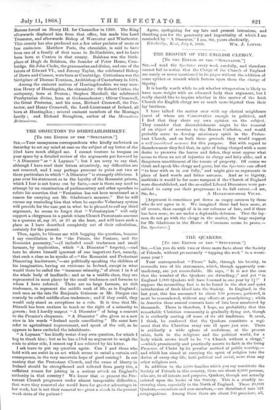THE BIGOTRY OF '['III; ENGLISH CLERGY.
[To THE EDITOR OF THE " SPECTATOR.")
read the Spectator every week carefully, and therefore cannot fail to notice that the Clergy of the Church of England are rarely or never mentioned in its pages without the addition of some epithet or remark which fastens upon them the charge of bigotry.
It is hardly worth while to ask whether vituperation is likely to have more weight with an educated body than argument, but I really should like to inquire whether in this matter of the Irish Church the English clergy are so much more bigoted than their lay brethren.
I have talked the matter over with my clerical neighbours (most of whom are Conservative enough in politics), and I find that they share my own opinion on the subject. They consider that disesta.blishmeut might be the removal of an object of aversion to the Roman Catholics, and would probably serve to develop missionary spirit in the Protes- tant Church, and on both these grounds they would support a well considered measure for this purpose. But with regard to disendowment they feel that, in spite of being charged with a mere desire to preserve the loaves and fishes, they must oppose what seems to them an act of injustice to clergy and laity alike, and a dangerous unsettlement of the tenure of property. Of course we think and speak like clergy and geese, but the Spectator can afford "to bear with us in our folly," and might give us arguments in place of hard words and bitter sarcasm. And as to bigotry, methinks it would be far more rampant if the Church of England were disestablished, and the so-called Liberal Dissenters were per- mitted to carry out their programme to its full extent.—I am, [Argument is sometimes put down as empty sarcasm by those who do not agree in it. We imagined there had been more, at all events, than enough of it in our columns of late, and if there has been none, we are under a deplorable delusion. That the lay- men do not go with the clergy in the matter, the large majority for Mr. Gladstone in the House of Commons seems to prove.— En. Spectator.]






























 Previous page
Previous page